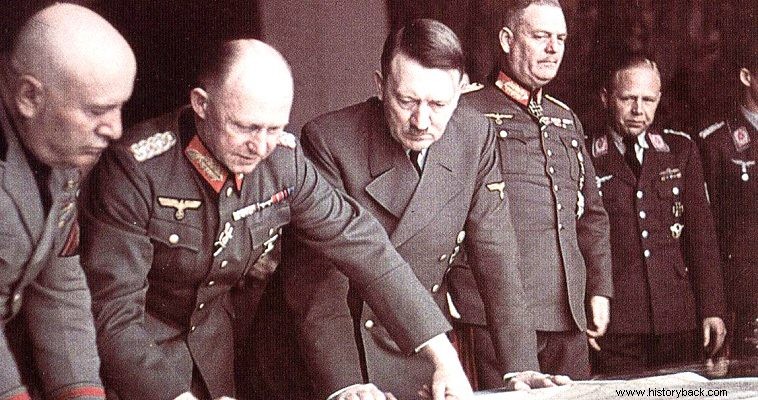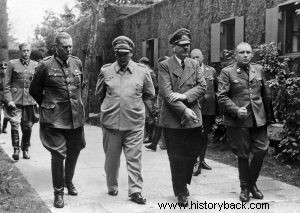
Already in 1943 the state of Hitler's health was tragic. According to some scholars, the symptoms of Parkinson's disease had already begun to manifest, which over time afflicted him more and more. This particular disease also dramatically affects the brain functions of the patient. His health was deteriorating alongside the deterioration of Germany's military situation.
After the assassination attempt against him (1944), he felt alone and betrayed, by his retreating generals, by his soldiers who did not show the necessary fanaticism, etc. This feeling of loneliness gradually strengthened. Hitler from some point on lived virtually alone, lost in a world of his own, which few pretended to understand, just to secure personal gain.
Many of the "sycophants", especially of the last days, likened him to Frederick the Great and entertained his fantasies of reversing the bad situation for Germany. Just as then (1763) the death of the Tsarina of Russia saved Frederick and Prussia from defeat and destruction, so now, he was told, the dichotomy between the "super-capitalist" countries (USA, Britain) and the "super-socialist" of the Soviet Union, they would save Germany, even at the last moment. Naturally, you raise the question of why Hitler kept the specific "scumbags" near him, why he didn't remove them.
General Heinz Guderian , in collaboration with the cold technocrat, Minister of Armaments Albert Speer, delivered a report of the latter to Hitler. The introductory sentence of the report read:"The war is lost". According to Guderian, as soon as Hitler read this sentence, he placed the document in his safe without saying a word. When he received no response, Speer returned to request a meeting with Hitler.
But he refused to see him, and when he received a new copy of the report he locked it in his safe without reading it again. He even complained to Guderian:“What Speer wants to tell me is that the war is lost and I must end it. Now you will surely understand why I no longer accept anyone alone. Everyone who wants to talk to me acts in the same way, because they have something unpleasant to tell me. I can't stand this".
It is easy to understand the mental decline of the leader who thought himself the ruler of the world. The more defeat and the resulting Nemesis slammed the door on the fragile Nazi edifice, the more Hitler retreated into a world of his own , far from the reality that hurt him so much.
Many attribute Hitler's "escape" to Dr. Morel, the doctor who tired him and the medicinal preparations he supplied him with. But can such a thing really be said? And if so, why did Hitler, when he wanted, maintain his clarity intact? It wasn't Dr. Morel who was responsible for Hitler's delusions, it was his own phobias that did not allow him to face reality.
Hitler did not fear for his life. After all, courage was a virtue that never left him until the end of his life. He was afraid of defeat and its consequences for Germany and the party.
Until the end he was a fanatic who believed in his "mission" and ideology. Already in 1934 he had said:“…if we cannot conquer the world, it will be possible for us to drag half of it into destruction with us and not allow anyone to triumph over Germany. We will never capitulate, never! It is possible for us to be destroyed, but if that happens, we will drag an entire world with us into destruction, a world on fire".
Such a man was capable of reaching extremes, as he eventually did. But how did such a literally demonic personality fall into huge strategic and tactical errors, which ultimately led to the defeat and collapse of the edifice that this same personality had built?
The answer to this question is probably more simple than one would imagine. Influenced by the initial triumphs and flatteries of the Eastern type despotic 'court' people ” that he had created, Hitler introduced a new model of governing the country and controlling military operations.
This model was highly centralized or highly decentralized, depending on the situation. For example, when a general at the front wished to rearrange his units he had to ask Hitler's permission. On the contrary, when someone from his inner circle desired anything, he secured the permission or, in the worst case, the tolerance of the "Führer". The army officers who became members of his court (Keitel, Jodl) adapted the orthodox doctrines of military art to the wishes and wills of their "master".
Hitler's assertiveness did not allow for a counterargument, and those commanders who dared to boldly expose their, fundamentally correct, opinions to him, were dismissed, such as Manstein or Guderian, for example. neither for his defeat in the Battle of England, nor for his disastrous intervention in the Battle of Stalingrad.
The same thing happened with the incompetent, militarily, SS leader Heinrich Himmler who carried out any war operation Hitler assigned him disastrously either in Alsace or on the Eastern Front. It is no exaggeration to say that Himmler's incompetence in commanding Army Group "Vistula" brought the Soviets to the gates of Berlin. However, Hitler never accused him of this. On the contrary, he accused of cowardice officers and soldiers who died for his sake at the front...
Of course, he belonged to the "old company" of the founding members of the party and for that reason he was in a safe place. Even when he tried to "dethrone" Hitler, in April 1945, he did not face the firing squad, as so many before him did, for far more trivial reasons. Naturally, this foreign model of directing the country's war effort brought defeat.

Hitler with Goering, the docile Field Marshal Keitel (left) and Martin Bormann (right).
